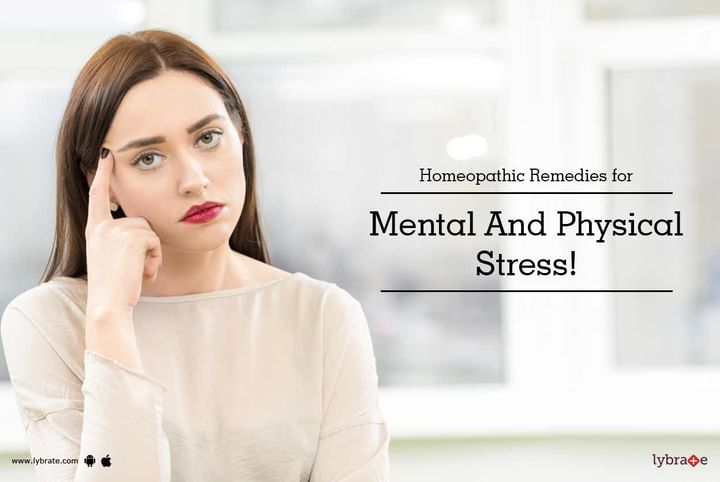Homeopathic Remedies for Mental And Physical Stress!
Depression is a state of low mood and aversion to activity that can affect a person’s thoughts, feelings, behavior and sense of well-being.
Depressed people can feel sad, empty, anxious, worried, hopeless, helpless, worthless, irritable, guilty, hurt, or restless. They may lose interest in activities that once were pleasurable, experience loss of appetite or overeating, have problems concentrating, remembering details, or making decisions, and may contemplate, attempt, or commit suicide. Insomnia, excessive sleeping, fatigue, loss of energy, or aches, pains, or digestive problems may also be present.
Causes of Depression
- Lifestyle: Lifestyle factors that may play a role in depressed moods include irregular sleep, poor diet, and lack of exercise. Poor diet may contribute to a depressed mood.
- Life events: Life events and changes that may precipitate depressed mood include childbirth, menopause, financial difficulties, job problems, a medical diagnosis (cancer, HIV, etc.), bullying, loss of a loved one, natural disasters, social isolation, relationship troubles, separation, and catastrophic injury. Serious injuries may predispose a person to have a depressed mood.
- Medical treatments: Certain medications are known to cause depressed mood in a significant number of patients. These include hepatitis C drug therapy and some drugs used to treat high blood pressure, such as beta-blockers or reserpine.
- Non-psychiatric illnesses: Depressed mood can be the result of a number of infectious diseases, neurological conditions and physiological problems including hypoandrogenism (in men), Addison’s disease, Lyme disease, multiple sclerosis, chronic pain, stroke, diabetes, cancer, sleep apnea, and disturbed circadian rhythm.
- Psychiatric syndromes: A number of psychiatric syndromes feature depressed mood as a main symptom.
Types of Depression
- Major depression: Major depression is characterized by a combination of symptoms that last for at least two weeks in a row, including sad and/or irritable mood that restricts the ability to work, sleep, eat, and enjoy once-pleasurable activities. Difficulties in sleeping or eating can take the form of excessive or insufficient of either behavior.
- Dysthymia: Dysthymia is a less severe but usually more long-lasting type of depression compared to major depression. It involves long-term (chronic) symptoms that do not disable but yet prevent the affected person from functioning at “full steam” or from feeling good.
- Bipolar disorder (manic depression): Another type of depression is bipolar disorder, which encompasses a group of mood disorders that were formerly called manic-depressive illness or manic depression. These conditions show a particular pattern of inheritance. Bipolar disorders are often chronic and recurring. Sometimes, the mood switches are dramatic and rapid, but most often they are gradual.
Complications of Depression
Depression can have a significant impact on the structure and function of many parts of the brain. This can result in many negative consequences. People with severe depression are at higher risk of suffering from anxiety, chronic depression, other emotional issues or having more medical problems or chronic pain. People with a chronic illness, such as diabetes and heart disease, who also have depression tend to have a worse outcome of their medical illness.
Treatment of Depression
Depressed mood may not require any professional treatment, and may be a normal reaction to certain life events, a symptom of some medical conditions. Lifestyle strategies that may improve depressed mood include wake therapy, light therapy, eating a healthy diet, meditation, exercise, and smoking cessation.
Homeopathic medicines for Depression
The homeopathic understanding of health is intimately connected to its understanding of the mind in general. Homeopaths don't separate the mind and body in the usual way; they generally assume that body and mind are dynamically interconnected and that both directly influence each other. Homeopaths base virtually every homeopathic prescription on the physical and psychological symptoms of the sick person. Psychological symptoms often play a primary role in the selection of the correct medicine. Trying to determine whether a person's mental state caused his physical disease or vice versa is rarely helpful in discovering the correct homeopathic medicine. The homeopath seeks to find a medicine that matches the totality of the person's physical and psychological symptoms, irrespective of "which came first."
Homeopathic medicines for Depression
- Arsenicum album
- Aurum metallicum
- Calcarea carbonica
- Causticum
- Cimicifuga
- Ignatia amara
- Kali phosphoricum
- Natrum carbonicum
- Natrum muriaticum
- Pulsatilla
The homeopathic treatment for depression is customized for you so that you get long term relief. The homeopathic treatment for depression is 100% safe and proven to be effective in most of our patients. The right homeopathic medicines for depression has to be chosen by a qualified and an experienced Homeopathic doctor. So, always consult a specialized homeopath.
In homeopathy, the practitioner prescribes the medicine after considering the totality of symptoms. He takes the elaborate history. Sometimes, it is important to know whether physical symptoms appeared first or mental symptoms appeared first to differentiate between the most similar medicines.
There are about 150 medicines indicated for this purpose. To find out the similimum or the most appropriate medicine a qualified homeopathic doctor takes an extensive account of patient's case taking the process and the chose it. Always consult a qualified homeopathic doctor, as your mental health is important.



+1.svg)
